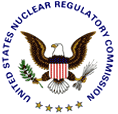| Search Options | ||||
| Index | Site Map | FAQ | Facility Info | Reading Rm | New | Help | Glossary | Contact Us | ||||

| Home > Electronic Reading Room > Document Collections > News Releases > 2006 > 06-020 |
|||||||||
 |
|
||||||||
| No. 06-020 | February 9, 2006 | ||||||||
NRC WELCOMES NATIONAL ACADEMIES STUDY CONCLUSION THAT TRANSPORTATION |
|||||||||
| The Nuclear Regulatory Commission welcomes today’s report by the National Academies on the transportation of spent nuclear fuel, which the agency believes validates its efforts to ensure the safe transport of spent fuel and high-level waste.
The report, "Going the Distance? The Safe Transport of Spent Nuclear Fuel and High-Level Radioactive Waste in the United States," was released today by the National Research Council, part of the National Academies. It was compiled by the Council’s Committee on Transportation of Radioactive Waste. The report’s principal finding is that there are "no fundamental technical barriers to the safe transport of spent nuclear fuel and high-level radioactive waste in the United States." Shipment of spent fuel by rail or truck is "a low-radiological-risk activity with manageable safety, health, and environmental consequences when conducted in strict adherence to existing regulations." The report also concluded that "the radiological risks associated with the transportation of spent fuel and high-level waste are well understood and are generally low." It attributed this conclusion in part to "rigorous international standards and U.S. regulations for the design, construction, testing, and maintenance of spent fuel packages." The committee recommended that the NRC conduct further research into the health and safety risks of long-duration fires engulfing spent fuel transportation casks. Although the committee took note of the NRC’s recent study modeling the effects of the 2001 Baltimore tunnel fire on spent fuel casks, that study was not completed in time to be considered fully by the National Academies in today’s report. That NRC study, and a similar one modeling the effects of a long-duration fire on a truck cask, concluded that no spent fuel would likely be released from NRC-certified casks under such fire conditions. The report also recommended that "full-scale package testing should continue to be used as part of integrated analytical, computer simulation, scale model, and testing programs to validate package performance." This recommendation is also consistent with the goals of the NRC’s Package Performance Study, which is now under development. Although the National Academies panel did not assess security risks of spent fuel transportation, it recommended that an independent assessment of security issues be conducted. The NRC has ordered licensees to implement several security enhancements since the Sept. 11, 2001, terrorist attacks and is in the process of completing a series of security assessments of spent fuel storage and transportation in the post-Sept. 11 threat environment. The National Academies study was sponsored by the NRC, the Department of Energy, the Department of Transportation, the Electric Power Research Institute, the National Academy of Sciences, and the National Cooperative Highway Research Program. |
|||||||||
|
Privacy Policy |
Site Disclaimer |